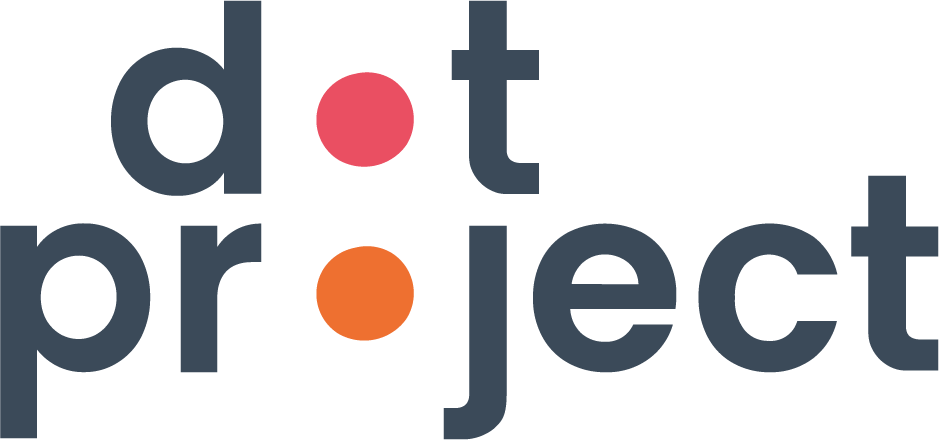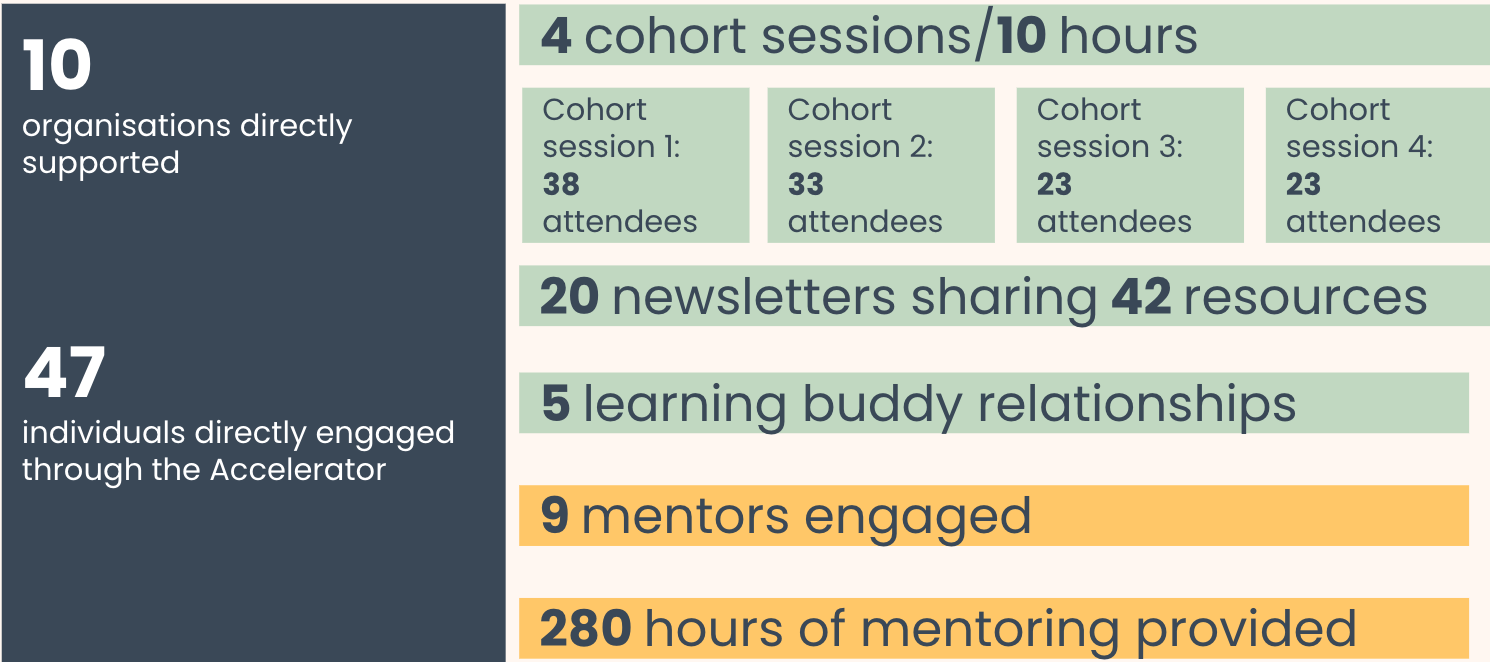Key learnings from our digital strategy accelerator
In 2022 Dot Project and Charity Digital began collaborating with Okta for Good to further their goal of building a safely connecting world where everyone can belong and thrive. We did this by embarking on a Digital Strategy Accelerator to build the resilience of charities in the UK. Our overall ambition is to pilot a three year support Accelerator to support the development, delivery and maintenance of digital strategies and roadmaps within organisations.
The timing for this Accelerator is critical. Charities rapidly adopted a range of digital tools and ways of working during the COVID-19 pandemic. Now they are faced with formalising their digital approach and securing funding to maintain and evolve their digital approach.
From January 2022 - December 2022 we delivered Year 1 of the Accelerator, supporting 12 organisations to develop a digital strategy and roadmap. From January 2023 - December 2023 we delivered Year 2 of the Accelerator, supporting 10 organisations (5 of which took part in Year 1). This Accelerator was designed based on our learnings from Year 1.
Our overall goal for Year 2 was to build organisational confidence and capability to enable them to achieve their digital ambitions. As a result our assumption is that they are more connected and are proactively delivering value within the social sector.
We worked towards this goal by focusing on building resilience. We define a resilient organisation as one that embodies the outlook of ‘being digital’. This means teams building the confidence, the culture, the skills [mindset], the practices and aptitude to work digitally [decision making] , supported by technology, data and processes [Infrastructure] that serve the organisation’s goals.
We provided a holistic range of support through the Accelerator through the delivery of cohort sessions which convened organisational teams, a learning buddy system which connected peer organisations together, and mentoring support providing one to one access to mentors for organisations.
Over a 9 month delivery timeframe we have seen critical shifts in the journey of the organisational teams. We have seen positive shifts in digital mind-set with organisations embracing tools and approaches to develop their culture, confidence and skills. Organisations report being more confident in their decision making related to digital as a result of the information and practices they have learnt through the Accelerator. Organisations reflect that their digital strategy and roadmap now feel more strongly aligned to their organisational goals and as a result they are on the way to ensuring they have the appropriate digital infrastructure in place to achieve their goals. This report captures our learnings.
Accelerator overview - in numbers
Accelerator overview - in numbers
Through the Accelerator we observed the following critical shifts within organisations. These can be summarised generally with the caveat that each organisation experienced these to varying degrees:
Key learnings
Through this Accelerator we have gathered key learnings and enhanced our experience to inform how we will evolve the Accelerator moving forwards. Our main learnings are:
Openness to develop a digital mindset is a key enabler
All organisations faced challenges as a result of broader contextual factors. This is a constant feature of working within the social sector. These factors included resource constraints, capacity limitations, and a lack of buy-in from senior leadership. Despite this we observed an openness to adopt a digital mindset amongst the organisations supported, building on knowledge gained. Organisations report that the Accelerator has influenced their perspective towards developing a digital mindset, and information and observations gathered through the Accelerator have provided more context in relation to the complexities and interconnected aspects involved in the process of shifting from ‘doing’ digital to ‘being’ digital.
Confident decision makers build digital confidence
Organisations, to differing extents, gained a clearer understanding of their organisation's digital practices. This, in turn, led the majority to progress towards a more informed approach in decision-making and collaborative practices for implementing digital strategies. A critical component of this confidence is knowing where to go for advice and acknowledging that digital should not be owned by one individual or a siloed team and is instead the responsibility of a cross-organisation team.
Strengthening digital infrastructure requires cross-functional teams
Organisations implemented a range of actions to enhance their digital strategies and roadmaps for organisational success. The majority of organisations have reported a change in digital thinking, reflecting more on how their tools, technology and processes aligned with their strategies. A third (30%) considered their approach to selecting digital tools as proactive, demonstrating ongoing development of readiness to navigate and adapt to digital challenges.
A critical enabler overall, and in relation to digital infrastructure is senior leadership buy-in and understanding. Whilst a delivery team may be able to identify the best fit tool or platform for their situation they need to secure investment and this requires the ability to influence and advocate to the overall budget holders and decision makers.
Proactive CEO involvement is essential
We saw organisations achieve strong alignment and clarity of direction where their CEO was actively involved in the Accelerator and participating in the cohort sessions and mentoring support. Some organisations had more passive CEO support, where their activities and involvement in the programme were signed off by the CEO but the CEO was largely absent from the Accelerator. Moving forward we will seek to ensure active CEO involvement is factored into the Accelerator design.
Mentoring provides access to critical expertise
The majority of the feedback positively reviewed the delivery and quality of support, including mentoring. Respondents were “optimistic”, “enthusiastic” “eager” and “excited to learn from and work with other organisations”. Overall 95% of respondents would recommend this Accelerator to other organisations. Creating the space for senior leaders from across the organisational cohort to engage with each other and providing more regular cohort sessions were two of the main improvements cited by individuals participating in the Accelerator.
Working as a team is game-changing
Echoing our learning from Year 1, Year 2 reinforced our hypothesis that that team learning ensures organisational learning, practices and actions are embedded much more than traditional individual learning programmes where only one individual from an organisation takes part in the learning experience. The Accelerator provides the space - including time and headspace - for teams to build alignment, shared understanding and opportunity to experiment. In our conversations with charities we heard that the Accelerator structure and the mentor approach acted as a means of accountability. Some organisations started the programme with trepidation about how they would find the time and space, over time they shifted to see that the Accelerator gifted them space and
Learning buddy system can create the space for sharing knowledge and experiences
This system worked well for most organisations and inspired broader networking by encouraging organisations to reach out to peer organisations not involved in the accelerator. A key learning has been that where there are vast differences between organisations - such as their size or digital priorities - the buddy system is less effective. Overall the Accelerator has provided space for connection which we see as critical to creating a more interconnected system.
Access to a range of mentor expertise is important
The Accelerator convened a unique set of skills across the 9 mentors who supported organisations. The most challenging aspect of the mentoring process is connecting the best fit mentors to organisations. The Accelerator achieved this in a matter of months, a key achievement. Looking forwards there is opportunity to iterate the application process and definition of organisational needs to include mentors at an earlier stage. Mentors also expressed that a more overarching view of the mentor support would help ‘inject’ mentor expertise in the right place at the right time. Moving forwards we will explore the possibility of establishing a Mentor Board and building processes which enable mentors with different areas of expertise to be able to engage with organisations at different stages of their learning journey.
Iterative Accelerator design approach provides flexibility
We proactively built feedback loops into the accelerator to enable the design to pivot and evolve in response to needs. This led us to reducing the duration of cohort sessions from 3 hours to 2 hours and changing mentoring briefs of specific organisations to respond to their changing circumstances. The data collection processes worked well however it could be strengthened by more joined up systems and easier access to information for all team members.
As we enter the design phase of Year 3 of this programme we will be building on our learnings to date and iterating our approach with a view to provide access to support to organisations by mid-2024.


